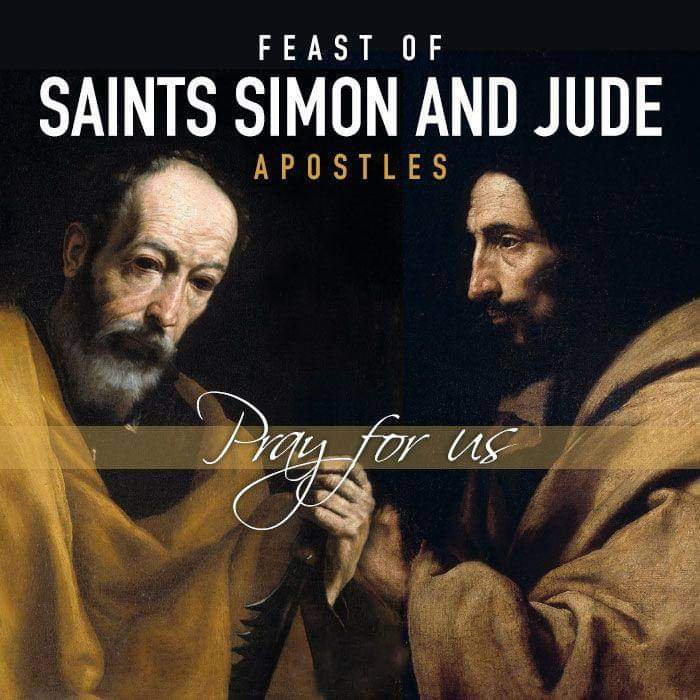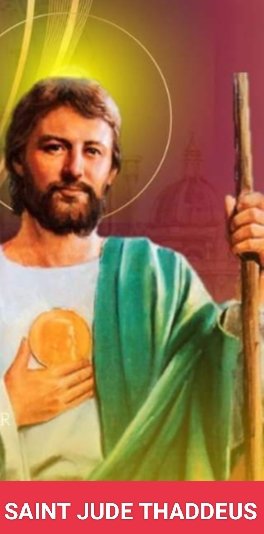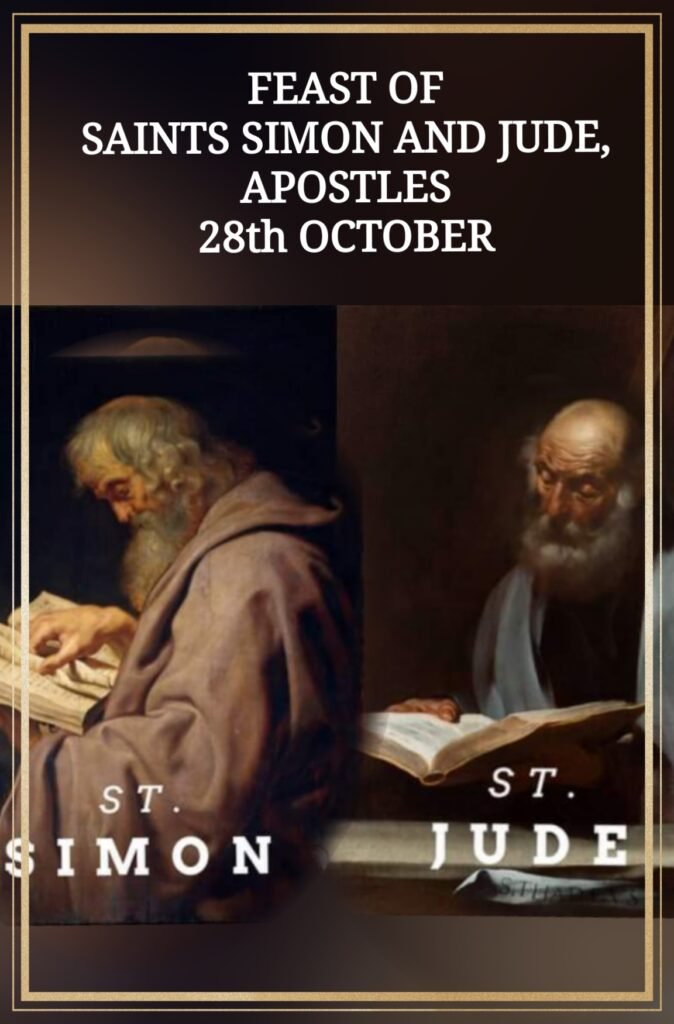FEAST OF SAINTS SIMON AND JUDE, APOSTLES, MARTYRS – 28 OCTOBER

SAINT JUDE THADDEUS, APOSTLE

St. Jude was a son of Clopas and his mother Mary was the Virgin Mary’s cousin. Ancient writers tell us that he preached the Gospel in Judea, Samaria, Idumaea, Syria, Mesopotamia, and Lybia. According to Eusebius, he returned to Jerusalem in the year 62, and assisted at the election of his brother, St. Simeon, as Bishop of Jerusalem. St. Jude was the one who asked Jesus at the Last Supper why He would not manifest Himself to the whole world after His resurrection.
He is an author of an epistle (letter) to the Churches of the East, particularly the Jewish converts, directed against the heresies of the Simonians, Nicolaites, and Gnostics. Though St. Gregory the Illuminator has been credited as the “Apostle to the Armenians,” the Apostles Jude and Bartholomew are believed to have brought Christianity to Armenia, where Jude was rumored to have later been martyred. He is believed to have been martyred either in Armenia or Beirut.
Following his death, St. Jude’s body was brought to Rome and left in a crypt in St. Peter’s Basilica. Today his bones can be found in the left transept of St. Peter’s Basilica under the main altar of St. Joseph in a tomb he shares with the remains of the apostle Simon the Zealot.
Pilgrims came to St. Jude’s grave to pray and many reported a powerful intercession, leading to the title, “The Saint for the Hopeless and the Despaired.” Two Saints, St. Bridget of Sweden and St. Bernard, had visions from God asking them to accept St. Jude as “The Patron Saint of the Impossible.”
Roman Catholics invoke St. Jude when in desperate situations because his New Testament letter stresses that the faithful should persevere in the environment of harsh, difficult circumstances -just as their forefathers had done before them; therefore, he is the patron saint of desperate cases.
When the apostles are listed in Matthew 10:3 and Mark 3:18, Jude’s name does not appear but “Thaddeus” does. This occurrence led early Christians to believe Jude was known as both “Jude” and “Thaddeus,” the latter of which could have been a sort of nickname. “Thaddeus” may have become a popular nickname for Jude following Judas Iscariot’s betrayal.
PATRON: Desperate situations; forgotten causes; hospital workers; hospitals; impossible causes; lost causes;
PRAYER TO ST. JUDE
O most holy apostle, Saint Jude, faithful servant and friend of Jesus, the Church honoureth and invoketh thee universally, as the patron of hopeless cases, and of things almost despaired of. Pray for me, who am so miserable. Make use, I implore thee, of that particular privilege accorded to thee, to bring visible and speedy help where help was almost despaired of.
Come to my assistance in this great need, that I may receive the consolation and succor of Heaven in all my necessities, tribulations, and sufferings, particularly (here make your request) and that I may praise God with thee and all the elect throughout eternity. I promise thee, O blessed Jude, to be ever mindful of this great favour, to always honour thee as my special and powerful patron, and to gratefully encourage devotion to thee. Amen.
+++++++++++++++++++++++++++++++++++
ST. SIMON THE ZEALOT, APOSTLE
Saint Simon is surnamed the Canaanean or Canaanite, and the Zealot, to distinguish him from St. Peter, and from St. Simeon, the brother of St. James the Less, and his successor in the see of Jerusalem. Hammond and Grotius think that St. Simon was called the Zealot, before his coming to Christ, because he was one of that particular sect or party among the Jews called Zealots, from a singular zeal they possessed for the honour of God and the purity of religion.
A party called Zealots were famous in the war of the Jews against the Romans. They were main instruments in instigating the people to shake off the yoke of subjection; they assassinated many of the nobility and others in the streets, filled the temple itself with bloodshed and other horrible profanations, and were the chief cause of the ruin of their country.
But no proof is offered by which it is made to appear that any such party existed in our Saviour’s time, though some then maintained that it was not lawful for a Jew to pay taxes to the Romans At least if any then took the name Zealots, they certainly neither followed the impious conduct nor adopted the false and inhuman maxims of those mentioned by Josephus in his history of the Jewish war against the Romans.
St. Simon, after his conversion, was zealous for the honour of his Master, and exact in all the duties of the Christian religion; and showed a pious indignation toward those who professed this holy faith with their mouths, but dishonoured it by the irregularity of their lives. No further mention appears of him in the gospels than that he was adopted by Christ into the college of the apostles.
With the rest he received the miraculous gifts of the Holy Ghost, which he afterwards exercised with great zeal and fidelity. If this apostle preached in Egypt, Cyrene, and Mauritania, he returned into the East; for the Martyrologies of St. Jerome, Bede, Ado, and Usuard place his martyrdom in Persia, at a city called Suanir, possibly in the country of the Suani, a people in Colchis, or a little higher in Sarmatia, then allied with the Parthians in Persia; which may agree with a passage in the Acts of St. Andrew, that in the Cimmerian Bosphorus there was a tomb in a “rot, with an inscription importing that Simon the Zealot was interred there.
His death is said in these Martyrologies to have been procured by the idolatrous priests. Those who mention the manner of his death say he was crucified. St. Peter’s Church on the Vatican at Rome and the Cathedral of Toulouse are said to possess the chief portions of the relics of St. Simon and St. Jude.
(Taken from Vol. III of “The Lives of the Fathers, Martyrs and Other Principal Saints” by the Rev. Alban Butler.)
PATRON: Curriers; sawmen; sawyers; tanners.
PRAYER TO ST. SIMON
O Glorious St. Simon, you were a cousin of Jesus and a devoted follower as well. You were called “the Zealot,” indicating that you were willing to give your life for your religion and your freedom as a human person. Obtain for us the grace to be willing to give our lives for Christ and to labor for the freedom and peace that only God can give. Help us to spend ourselves for God on earth and be received by him in eternal bliss in heaven. Amen
